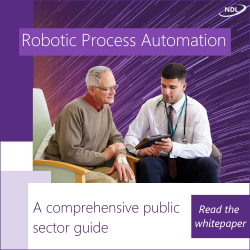
Education professionals, AI specialists and edtech experts recognise the opportunities of AI in schools and some are already using relevant tools, according to the Department for Education (DfE).
It said this sums up the responses to its first call for evidence on generative AI in education, which will provide a basis to inform future policy on the issue.
Among the findings are that some schools are already using AI to streamline administrative tasks, create subject-specific resources and provide personalised support for learners with special educational needs and disabilities.
Other opportunities identified include the creation of more interactive lessons, and additional support for learners for whom English is an additional language.
Transformative tech
Education Secretary Gillian Keegan said: “Artificial intelligence is here to stay and it’s already changing the way we work and learn. To take advantage of this transformative technology, it’s crucial we get our approach to it right.
“It’s heartening that many education professionals are already seeing the tangible benefits of AI – something I witnessed myself at our AI hackathon earlier this month – while remaining alert to its risks.
“The results of the call for evidence give us a crucial evidence base to inform our future work on AI, helping us make the right decisions to get the best out of generative AI in a safe and secure way.”
In October, the DfE announced an investment of up to £2 million in Oak National Academy to create new teaching tools with AI.
BCS stance
BCS, The Chartered Institute for IT, has added a further element to debate on the issues with a call for schools to teach children how to use AI from the age of 11.
It said pupils must learn to work with AI tools such as ChatGPT, understanding their strengths and limitations, and need a new alternative digital literacy qualification with an emphasis on AI and other modern digital skills.
It said the current Computer Science GCSE works well only for a narrow group of students due to its theoretical focus, and most exam boards do not specify AI at all.
In response, the existing GCSE should be broadened to include a focus on how AI is built, as well as its risks and opportunities; and an understanding of AI should become a key part of teacher training and headteacher’s professional leadership qualifications.
The organisation commissioned its own poll by YouGov that showed 74% of over 1,200 parents in England supported the introduction of a wider IT skills qualification, and 96% said learning IT skills at school was important.
Need for change
Julia Adamson, director of education at BCS, said: “The digital literacy options available need to change immediately, so that the UK’s teenagers don’t get left behind.
“What we have now is great if you want to become a computer scientist – degrees in computing are more popular than ever. But children who aren’t going to specialise in coding early on also have a right to those essential digital skills, including understanding AI, so they can hold their own in the global workplace.
“Everything from marketing to law is going to require pretty strong knowledge of generative AI in the future so it has to start in the classroom at a young age.”
DfE has also published the results of its Technology in Schools Survey, which drew responses from 1,877 schools.
Strategies and policies
Among the findings are that 68% of secondary schools and 55% of primary schools had a digital strategy in place, with headteachers being most likely to play the leading role, but 51% of teachers saying they were guided by school policy but could also make their own decisions.
There was a ratio of at least one laptop per teacher in 63% of secondary schools and 75% of primary schools, with figures of 9% and 42% respectively for tablet computers. 86% of teachers used whiteboards, 86% laptops, 74% desktops and 65% tablets as part of their lessons.
Just over nine in 10 schools of both types reported they had some laptops available for children, while 54% of secondaries and 77% of primaries said they had tablets available.
Almost all the respondents said technology was used in classroom lessons and in a range of administrative functions.
School leaders showed more optimism than teachers over how technology is supporting pupil attainment. 67% of leaders and 45% of teachers thought it had provided benefits over the past three academic years, while 83% and 64% respectively thought it would do so in the future.
Among the barriers to using more technology, budgetary constraints were the largest, identified by 96% of leaders and 89% of teachers, while the cost of continuing professional development was also important at 63% and 65%, along with the time needed at 68% and 75%.





